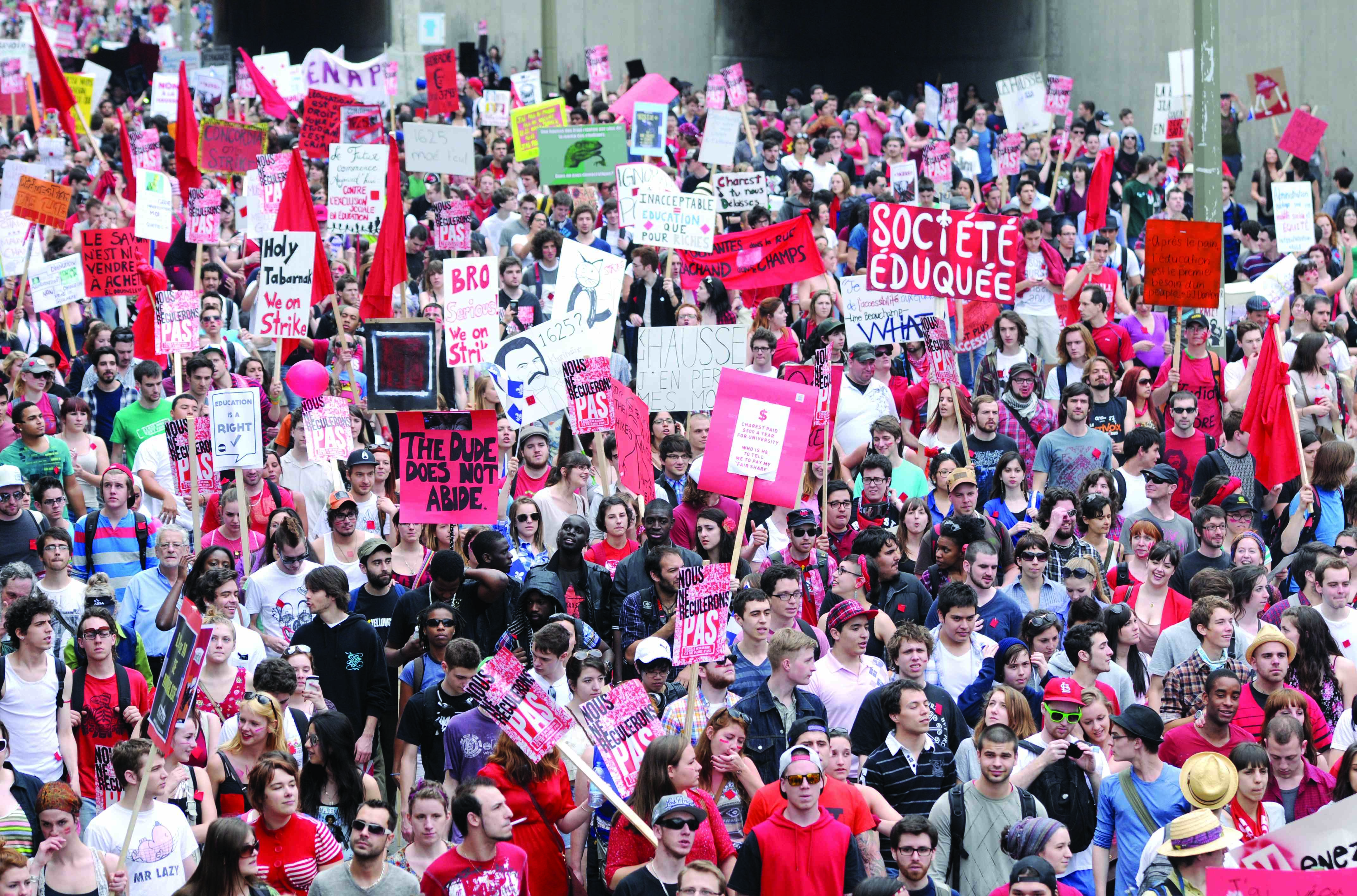Over 200,000 people took to the streets in the historic March 22 protest against tuition increases, but as far as the provincial government is concerned, the hikes are here to stay.
The march began officially at Place du Canada, where buses full of students from outside the city started arriving earlier in the day. The approximate length of the route was five kilometres, with protesters marching down both Sherbrooke and Ste-Catherine Streets to their ultimate destination, Place Jacques-Cartier in the Old Port.
Protesters held signs denouncing Premier Jean Charest’s Liberal government, the leadership of Education Minister Line Beauchamp, and the idea that accessible education is not a priority.
Despite the massive turnout, the protest was extremely peaceful and the SPVM reported no major incidents during or after the march. Police presence was very light in comparison with other demonstrations that have taken place over the past few weeks.
On the morning of March 22, Charest told reporters at the National Assembly in Quebec City that his government would “never stop listening to students.”
The next day, his education minister told the Canadian Press that students needed to get back to class or risk facing consequences. Beauchamp reiterated that the government would not back down from its decision, and said that should students continue to boycott classes, they risk having their classes scheduled at night and semesters extended. Concordia already indicated in a previous statement that it has no intention of prolonging the winter term.
“We called for a peaceful, but loud demonstration. It was the biggest demonstration in the history of Quebec,” said Martine Desjardins, president of the Fédération étudiante universitaire du Québec.
She went on to say that “Beauchamp has no choice now but to answer to 200,000 people speaking with one voice demanding accessible education.”
“The mobilization exceeded all our expectations,” said Fédération étudiante collégiale du Québec President Léo Bureau-Blouin. “This is a precedent in student mobilization and I’m sure it’s going to have a huge impact on the Liberal government.”
The Concordia delegation lead the way for the better part of the three-hour demonstration.
“This sends an incredibly strong message to the government,” said Concordia Student Union President Lex Gill of the protest. “If anything else, the Liberal party has lost 200,000 voters for life.”
The participation far exceeded the predictions made earlier in the day, proving that there is more public support for the student movement than estimated. Despite the success of the demonstration, Gill explained that protesters still have much work to do.
“The fight is not over,” she said. “There will be massive actions in the coming weeks until the government backs down.”
Participants in the March 22 protest represented every age demographic, from toddlers with their parents to cheering grandparents. Grade 10 student Terra Leger-Goodes of Paul-Gerin-Lajoie School in Outremont was at the march with a large group of students from her class.
“We heard that the cost of going to university is going up by a large amount, so we’re here to protest that. Society can only advance if people can go to school and gain knowledge,” she said, mentioning that by the time she enters university four to five years from now, the government’s tuition hikes will have almost reached their maximum. The Charest Liberals are planning to increase tuition by $325 a year between 2012 and 2017.
For grandmother Danielle Genereux, accessible education is an issue that affects everyone in Quebec, and should be at the top of the government’s priority list.
“Major investments in education should be an absolute priority. There should be no further discussion on that,” said Genereux, a grandmother of seven. “[The government] says opposition against tuition increases is not representative of the whole population. But today, they will see that it is representative.”
At the end of the march, Coalition large de l’Association pour une solidarite syndicale etudiante spokesperson Gabriel Nadeau-Dubois told students to return to their schools and to keep the student movement going. By 6 p.m., most of the protesters had dispersed, crowding into the nearest metro stations.
CLASSE, one of the main organizers of the day’s march, is planning a series of protests next week in an effort to cause an “economic disturbance” in the city, which they say will only end when the government retracts its decision to up tuition.
Opposition parties lend their support
Earlier in the morning of March 22, a press conference was held at Palais des Congrès by the Fédération étudiante universitaire du Québec and the Fédération étudiante collégiale du Québec, and included representatives from groups such as the Centrale des syndicats du Quebec and the Confédération des syndicats nationaux, as well as opposition political parties, the Parti Québécois, Québec Solidaire and Option nationale.
At the conference, PQ leader Pauline Marois reiterated that a PQ-elected government would not proceed with the tuition hikes, and would call for a provincial summit on post-secondary education. “The Charest government must stop considering students as enemies of the state,” she said.
QS spokesperson Françoise David, for her part, emphasized that the government could increase taxes on larger corporations in order to bring in more revenue, rather than asking for more money from students.
After the conference, PQ post-secondary education critic Marie Malavoy spoke to The Concordian about the issue of mismanagement of public funds in Quebec universities that has often been brought up in the debate on tuition increases.
Referring to Education Minister Line Beauchamp’s recent decision to fine Concordia with $2 million for handing out six severance packages totalling $3.1 million, Malavoy said “there is no reason to have targeted one university. We must look at the salaries, the benefits and the severance packages at all universities. It’s foolish to think it’s just Concordia,” she said.
Malavoy mentioned that an idea has been floating among PQ ranks to institute a “commission” to look more closely at the management of public funds in Quebec universities.
With files from Joel Ashak.
